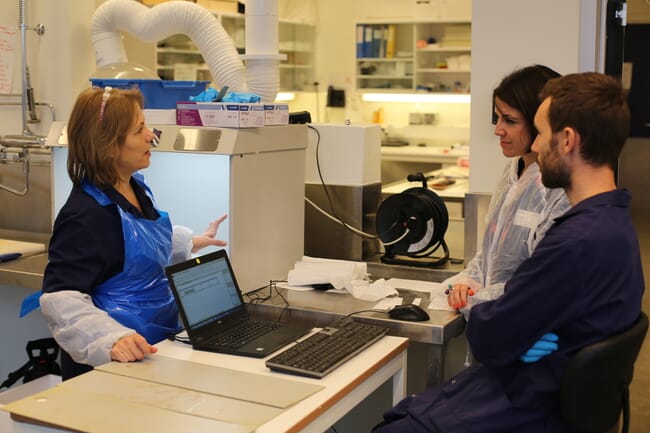A study undertaken by Nofima in collaboration with Aker BioMarine, investigates the health parameters and meat quality of Atlantic salmon fed a diet where fish meal was substituted with krill meal during the finishing feeding period.

The results of the trial, which have just been published in the British Journal of Nutrition, suggest that krill meal has a number of benefits.
“Antarctic krill meal has sparked the interest of marine researchers due to its nutritional profile. Previous studies have shown the proven effects of krill, with this study we wanted to uncover the basic mechanisms behind these effects, on farmed Atlantic salmon. The overall goal is to improve the systemic understanding of dietary krill meal effects on a biochemical, morphological and molecular level,” says Nofima’s Dr Turid Mørkøre.
The experiment involved 800 Atlantic salmon, weighing just over 2.2 kg each, which were randomly distributed across eight sea cages at the LetSea feed trial unit in Norway. The study experimented with supplementing krill meal (12 percent) in a low fish meal diet (5 percent) among salmon. All feeds were designed to meet the nutritional requirements of salmonid fish, with balanced EPA and DHA content. After 10-weeks, the fish were bulk weighed, and 20 fish from each sea cage were randomly selected for analysis.
The results
Overall, the study revealed positive effects on salmon health. Key findings suggest that krill meal inclusion:
- Led to more voluminous body shape and higher condition factor.
- Reduced fat accumulation around the heart.
- Led to a more ordered and stable collagen architecture and better muscle integrity in the fillet.
- Resulted in a boosted expression of immune genes in liver, including enhanced liver colouration and increasingly responsive structural genes.
- Reduced inflammation in the hindgut and removed the presence mucous.
“We knew that nourishing salmon with krill supplemented diets benefits salmon performance, overall health and fillet quality. With these new findings, we now also understand why,” says Dr Tibiabin Benitez-Santana, director of fish nutrition research at Aker BioMarine.
“This study is an important step in fish diet and welfare research. Krill represents the single largest marine biomass on Earth. That, coupled with its powerful nutritional value as shown in this study, as well as the sustainable methods of harvesting, make Antarctic krill meal a natural contender as a supplement in low fish meal diets.”
About Antarctic krill meal
Antarctic krill meal is considered one of the most sustainable marine sources of protein for aquafeeds. With a nutritional profile consisting of proteins, amino acids and ash contents, it serves as a viable alternative to fish meal. Due to this, krill has garnered interest from the research community, who seek to understand how the krill’s high levels of EPA and DHA, phospholipids, vitamins, nucleotides and natural astaxanthin impact fish health and welfare when supplemented in diets.
Aker BioMarine was the first krill fishery to receive the Marine Stewardship Council certification. And, for the fifth year in a row, received an ‘A’ rating from the Sustainable Fisheries Partnership (SFP), an independent non-profit organisation that evaluates the sustainability of global fisheries, meaning its krill fishery is in “very good condition.”



